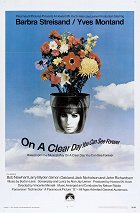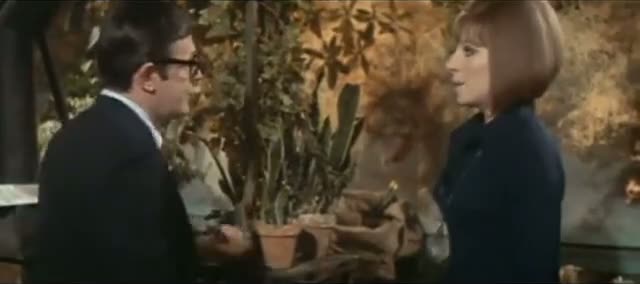Reżyseria:
Vincente MinnelliZdjęcia:
Harry Stradling Sr.Muzyka:
Nelson RiddleObsada:
Barbra Streisand, Yves Montand, Bob Newhart, Larry Blyden, Simon Oakland, Jack Nicholson, John Richardson, Pamela Brown, John Le Mesurier, Leon Ames (więcej)Opisy(1)
Daisy Gamble can be described as an eccentric woman who hears phones before they ring. Determined to kick her smoking habit for the sake of her fianc , she enlists the help of a psychiatrist and undergoes hypnosis. During her visits, it is revealed that she can regress into past lives and channel her many different personalities and her doctor finds himself falling in love with one of her old personalities. (oficjalny tekst dystrybutora)
(więcej)Recenzje (2)
With the Barbra Streisand’s singing and cleavage in the lead roles, On a Clear Day You Can See Forever is a colourful film on the surface, but rather gives a grey impression. The last project made fully under director Vincente Minnelli's control (he later fought to no avail with American International Pictures over the final form of the subsequent A Matter of Time), the film fails to conceal the fact that behind it is a man who longs in vain to understand rapidly changing times. With respect to the period in which it was made, which favoured more aggressive filmmakers, the style is very sedentary with a slow pace and modest in its approach to the topic of love. Not even Jack Nicholson, apparently cast as the fashionable mascot of hippie films of the era, is able to give it any vitality. The only livelier singing performance (starting on the roof of a skyscraper) comes at the moment when most viewers, without a weakness for the golden era of Hollywood musicals, have either left or fallen asleep. 50%
()
The genesis of On a Clear Day You Can See Forever is truly admirable. Henry James wrote the novel "The Sense of the Past" in 1917. A decade later, in 1926, the text was turned into the play "Berkeley Square." The film (1933, 1951) and television versions (1959) were made under this title. In the mid-1960s, the material would catch on on Broadway under the new title "On a Clear Day You Can See Forever" (1965). From there, it's just a step to a new film musical with a new musical star, Barbra Streisand, whose partner is Hollywood's successor to Maurice Chevalier, Yves Montand. So much for the answer to why even such a seemingly modern substance is stuck in the past while funny characters like Jack Nicholson with a sitar won't change that.
()

